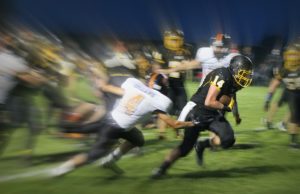A concussion is a traumatic brain injury caused by force to or around the head. Many simply describe a concussion as a “brain bruise,” but the nature of the injury can be far more complex.

Concussion awareness has increased tremendously in recent years, mainly due to neurological research involving professional athletes who play contact sports, such as football or soccer. This research has connected repeated concussions with other serious side effects, like chronic headaches, bouts of depression and early-onset dementia.
Can you have a brain injury without contact?
Those who have ever been involved in a rear-end collision can attest to the head-snapping jolt that typically occurs when one is suddenly and unsuspectingly struck from behind by a speeding vehicle. Even if the head never makes contact with anything, a concussion can still be sustained. The violent “whiplash” movement can cause the brain to slam against the skull, as well as cause nerves to tear and ligaments in the neck to stretch. These injuries can combine to disrupt the brain’s normal chemistry, possibly affecting one’s memory or ability to concentrate and learn.
Do all concussions involve a loss of consciousness?
Diagnosis of concussions can be challenging for physicians because the symptoms can vary amongst individuals or take time to become evident. Many who suffer from a concussion fail to report it because they (or their family members) do not recognize the warning signs.

Consequently, their recoveries are unnecessarily delayed or complicated because they did not receive the treatment that they needed. Some mistakenly believe that a person must be “knocked out” or lose consciousness to sustain a concussion. To combat the misconceptions and miseducation surrounding brain injuries, here are some symptoms to look out for in the days that follow the injury:
Symptoms of a brain injury
- Persistent headache
- Vertigo-like symptoms (dizziness, nausea, blurry vision)
- Sensitivity to noise and light
- Ringing in ears
- Concentration problems (forgetfulness, inability to focus at work or school)
- Overwhelming fatigue
Family members, friends, and colleagues can serve an extremely important role in assisting with the diagnosis of concussions because, unlike doctors, they have the unique perspective of knowing how the injured person acted before the head trauma occurred.
What to look for if you suspect someone has had a brain injury
The following signs should be reported if observed:
- Significant changes in personality, mood, or behavior (sadness, anxiety, etc.)
- Confusion (unable to find words during conversation; memory issues)
- Decreased coordination
- Trouble sleeping
- Changes in vision or hearing
If any of these “red flags” are noted after a traumatic event, the injured person should be assessed immediately by a medical professional.
The attorneys at Allen & Allen are here to use our knowledge of the law and experience to protect all who are injured due to the negligence of others. If you have been injured due to someone else’s recklessness, you may be entitled to compensation. Call our brain injury attorneys today at 866-772-1384.





